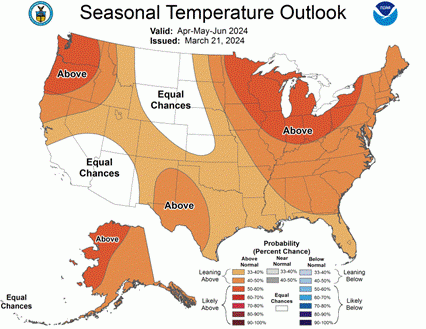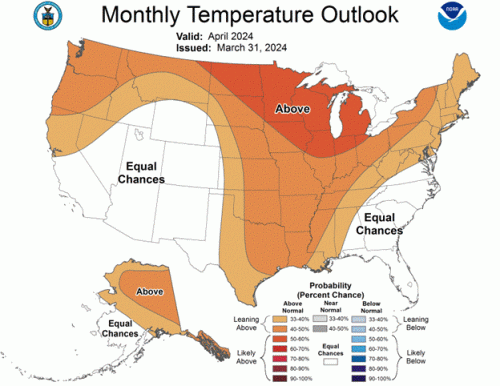
A story published by John Deem of the Savannah Morning News (SMN) claims that a warmer-than-normal spring that is expected this year is “under climate change’s influence.” This is false. [emphasis, links added]
SMN is conflating short-term weather patterns with long-term climate change and an examination of real-world data does not support their conclusion.
The article comma titled ‘Ma Nature’ Expected To Nurture Warm Spring In Savannah Under Climate Change’s Influence was published on the website of the newspaper on April 2, 2024. The article makes this claim:
Spring is likely to be warmer than usual in Savannah and across Georgia this year, according to the latest long-term forecast from the National Oceanic and Atmospheric Administration’s Climate Prediction Center.
That’s nothing new. Thanks to warming fueled primarily by heat-trapping pollution from the burning of fossil fuels, average spring temperatures have climbed considerably locally and over much of the Southeast over the past 50 years.
Although it is unclear in the article which long-term forecast from the Climate Prediction Center SMN is referencing, this Seasonal Temperature Outlook in Figure 1 below is the most likely candidate:

The key in Figure 1 shows colors that match different regions, for Savannah GA, the orange color relates to a “leaning above” 40 to 50% probability of a warmer than normal spring. That is hardly certain.
Interestingly, the one-month outlook issued by the Climate Prediction Center shows equal chances for Georgia and much of the southeastern United States. (See Figure 2 below)
Basically, that prediction is no better than a coin flip; it could be warmer, or it could be cooler. With such a lack of precision over the shorter term of one month, a three-month forecast is not likely to be any better.
SMN is making its claim of a warmer spring driven by “climate change’s influence” based on a forecast with a high level of uncertainty.

A short-term change in weather patterns over a few months from year to year is not the same as long-term climate change.
It is well established in the scientific community that at least 30 years of changing weather must be recorded for it to become a climate pattern.
To create a climate record, 30 years of weather data is averaged to create a “normal” climate expectation for a location or region. Three months in one spring season is woefully short of that requirement.
More than that, SMN failed to do any detailed analysis of historical temperatures. According to State Climate Summaries 2022 from the National Oceanic and Atmospheric Administration (NOAA) temperatures were actually far warmer in the past than they are today as seen in Figure 3:

The observed number of hot days has fallen in Georgia since the peak in the early 20th century.
Looking at the written summary on temperatures, NOAA has this to say: “Temperatures in Georgia have risen by 0.8°F, about half of the warming for the contiguous United States, since the beginning of the 20th century.”
Georgia is falling behind when it comes to warmer temperatures. If in fact “climate change’s influence” was driving warmer temperatures as SMN claims, we would see it in the data but the exact opposite is true.
Finally, according to World Population Review, the city of Savannah has seen explosive population growth since the beginning of the 20th century. Clearly, people seem to prefer the climate of Savannah with obviously little concern over climate change-driven temperature.
SMN editors and writer John Deem didn’t do their homework when it came to making claims of “climate change’s influence” for this spring that according to the forecast may or may not come to pass.
It is just one more sad example of the media spinning a climate change narrative instead of paying attention to actual data and the relevant skill of a forecast.
Read more at Climate Realism



















Just remember the classic TV Commercial for Chiffon Margarine ITS NOT NICE TO FOOL MOTHER NATURE
The M.S. Media needs to refrain from giving us false news and give us the Truth quit following the NYT’s Lemmings over the cliff